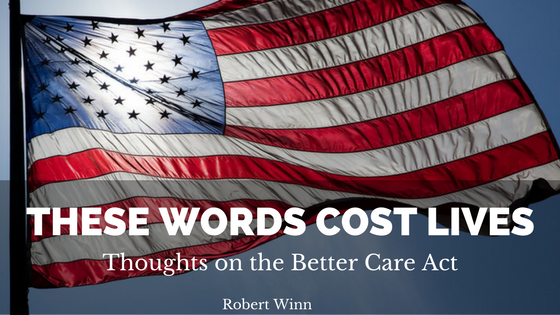It’s two in the morning and you’re sitting in an uncomfortable chair in the pediatrics ward, scared out of your mind. Your five-year-old daughter started coughing a week ago, but you figured that she had picked up a cold from another child at her kindergarten – nothing that couldn’t be fixed with a little chicken soup and care. But you’ve been pulling 12-hour shifts to make ends meet and you hadn’t realize just how bad it had gotten until last night, when she woke you up at midnight with awful, tearing coughs that went on and on and on.
You rushed her to the hospital and let the doctors whisk her away; they somehow managed to soothe her lungs and put her to sleep, but you still can’t stop yourself from holding her hand and worrying that she’s in pain; that she’ll wake and restart those horrible, hollow sounds.
You had to tell the nurse that you don’t have health insurance. She didn’t say anything, but the look on her face confirmed your fears: The tests and hospital stay that kept your daughter alive will cost far more money than you have to give.
Situations like these beg the question: when did money become more important than a human life?
There has been a lot of discussion in the past few months about health care reform. The House and Senate have both attempted to pass overhaul bills: the American Care Act and the Better Care Act, respectively. Ironically, though, very little of the conversation has actually been about care, or even health.
Instead, debates have abounded about how to optimize the bottom line, gouge taxes, and lower the national deficit. Prominent Republican senators have offered up amendments which would allow for low-cost plans that would fall short of covering even the basics of necessary care.
The now-abandoned Better Care Act would have repealed the Affordable Care Act and replaced it with a system primarily based on federal tax credits, which were intended to alleviate the cost of purchasing private health insurance for citizens. It would have additionally axed taxes intended to help fund the Affordable Care Act, and put Medicaid under a budgetary constraint – capping the previously open-ended amount spent on its programs. States would have been allowed to drop previously mandatory benefits such as mental health treatment, maternity care, and emergency services. Many of the restrictions previously imposed on private insurance rates would have been lifted, leaving corporate competition and the open market to run amok on prices.
Let me be frank: the Better Care Act would have been the policy equivalent of Wile E. Coyote sprinting determinedly over the edge of a metaphorical cliff – and the American people would be the ones to suffer the fall.
A report from the Congressional Budget Office found that 32 million Americans would lose coverage in nine years if the bill was passed.
Take a moment to think about that. Studies have repeatedly proven that those without insurance are more likely to avoid seeking the medical care they need out of fear for its cost. Had the parent in the earlier scenario opted to stay at home and try to help his sick daughter himself rather than seek professional help, she might have died – and if he’d been able to bring her to the doctor without worrying about the high cost of treatment earlier, she might not have been hospitalized in the first place.
Medical care isn’t a luxury, it’s a basic human necessity. For some, losing coverage may mean losing their lives years earlier than they otherwise would have. Continuing to push a plan after it’s been projected to strip tens of millions of people of their insurance isn’t just a questionable decision – it’s downright cruel.
Thankfully, the bill flopped after widespread condemnation from both sides of the political aisle. The problem at hand is – for the moment – shelved. But I would argue that our troubles with reforming health care are long from over, because the current administration has shown a frightening disregard for aiding those most vulnerable in our society.
The so-called Better Care Act was indisputably draconian. It planned to minimize funding and shift financial responsibility onto the states, but didn’t account for the sudden fiscal hole that would result, or provide a plan for the enormous number of people who would be dropped from a suddenly-underfunded Medicaid. It would even have allowed insurers to hike up costs for the elderly and those living with pre-existing conditions to untenable heights. But perhaps most tellingly, it would serve tax cuts to the nation’s wealthiest at the expense of those with the lowest incomes.
Former president Barack Obama recently commented in a Facebook post: “The Senate bill, unveiled today, is not a health care bill […] It’s a massive transfer of wealth from middle-class and poor families to the richest people in America. It hands enormous tax cuts to the rich and to the drug and insurance industries, paid for by cutting health care for everybody else.” As Mr. Obama suggests, this health care plan had very little to do with seeking out a better way to meet our nation’s medical needs, and everything to do with advancing the financial interests of the wealthy. In analyzing the bill, it’s painfully clear that its writers were never among those who worried that they might not be able to afford a trip to the doctor’s, or a necessary medical test.
Truthfully, we got lucky this time; enough moderates and far-end conservatives took issue with the bill to prevent it from passing. But I worry for the next time, when the right compromise is made in the wrong piece of legislation and allows a more politely draconian plan to take hold. I worry that in the next three years, more uninsured parents will find themselves in the pediatrics ward, desperately hoping that their child pulls through, and that they’ll be able to stretch their income over the cost once they bring them home.
We need to reform healthcare, and find a solution that doesn’t involve gutting any chance our nation’s most vulnerable have to access affordable medical care. We can’t afford careless writers when our lawmakers carry a nation’s lives in their pens.


